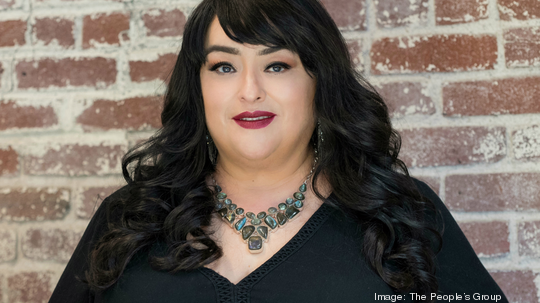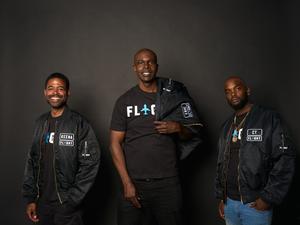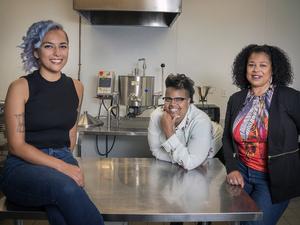
Christine De La Rosa, who owns the The People's Ecosystem dispensary in Oakland, launched a $50 million fund and accelerator last year called The People's Group Fund to help other underrepresented founders in the cannabis industry get the capital they need to launch new businesses, along with the mentorship they need to see them succeed.
The decision was inspired by her own struggles as an entrepreneur trying to find investors to back her idea. But, with cannabis businesses largely locked out of traditional banking and investment opportunities due to federal restrictions, raising money for the fund posed its own unique challenges.
Instead of traditional sources of capital she turned to private investors attracted to her vision of impact investing, including former Sequoia Capital Chief Information Officer Chad Dyer and his wife Tena.
I spoke with De La Rosa about the need for impact investing, what she looked for in investor partners and the still prevalent barriers for entrepreneurs like herself.
Why did you start the The People’s Group Fund? I'm Mexican and I'm a woman. There's only 1.6% of funding in the VC world available to me. I have what I consider one of the foremost companies around social equity frameworks, around community engagement, around creating generational wealth, and I could find almost no funding. On top of that, I didn't know a lot of things about how to raise capital. I made a lot of mistakes and learned a bunch of stuff. It was like a crash MBA course. I've seen people write checks because you're an MBA and you come from Harvard and they know your brother's son. I didn't have that, but I wanted to create a fund where I could provide the same level of access to capital funding for startup and growth capital for BIPOC and women-owned cannabis companies. A lot of times you'll see funds come up for BIPOC people or women and they're like, 'we're gonna give you $250,000.' You're like, "I appreciate it but that's only gonna get me through a month." I wanted to create the fund that I wished I had had.
Tell me more about some of the inequities in the cannabis industry. I think the biggest inequity is that we don't have access to banking. I've had two restaurants, a retail shop and an art gallery. And I could, based on my receipts, walk into any bank and get a loan against the production of income of my company for reasonable rates. Because the cannabis industry is not federally legal, we're having to get payday loan rates of like 30%. Larger companies maybe have access to better rates, but it's still maybe 12%. That's still highway robbery. Not having access to safe banking is an inequity.
How did you meet the Dyers? Somebody connected me. They were very interested in doing impact investing and that really is who I want for my fund. Look, cannabis is going to make a ton of money. All I'm asking when we're reaching out to investors is that they also not only care about the KPIs and equity waterfall, but also what the impact KPIs. Here you have the only industry in the US that comes out of an illegal market and was mostly made by Black and brown people selling, growing and going to jail. So I'm looking for people that understand there has to be some impact. Not just getting my 10x but also getting my 5x for the community that benefits from the money, which are people of color and formerly incarcerated people.
Can you tell me your first investment from the fund? The first investment was a lab company owned by BIPOC people — Filipino, Mexican American, African-American — called Spectrum CannaLabs in Davis.
How many companies are you currently investing in? We have 20 people in our due diligence process right now, and these are all founders that I've been working with for a year to get them ready to come to the fund. I prepared them and they're going through the process and even if we decide not to invest in them, they're ready to be invested in because they have their data rooms and all of their documents.
There's an investment arm and an accelerator as part of the fund, right? Yes, and the accelerator is one-on-one. A lot of times we've found that accelerators do cohorts with 10 to 20 people. The problem with that is you end of having 10 or 20 people that kind of know how to raise money. And because people are on different parts of the journey, some people are not getting the value. So for the accelerator, it's an eight-week course and it's one-on-one.
So founders can apply for either the accelerator or investment? Yeah, if you're a founder and you just need us to start doing our due diligence, let's look at that. A lot of our social equity founders have never done this before. They don't even know what they need. I've seen founders who've never raised capital before and had a really great idea, a very unique concept. They may not be ready for investment from me now but I want to prepare them to have investment later. It's incredibly arduous to do one-on-ones but it's also incredibly satisfying because people of color and women need to be able to really learn the art of the raise. Our first cohort starts in January 2022. They're meeting with everybody on my team and in last two weeks we actually teach them how to pitch what they're doing to make sure that they know what EBITDA is and SOW (statement of work) is and what SOP (standard operating procedure) is because a lot of times they don't. If you said, how much do you make after taxes, people understand that. But if somebody says, what's your EBITDA? The first time somebody asked me that, I was like, um… Because I had never heard it called EBITDA.
I didn't know what EBITDA was until about four years ago. Like, what's this acronym? I remember the first time an investor asked me that. I didn't know what that meant and I wasn't in a place where I could look it up. I was in front of this guy and I remember feeling such embarrassment and shame because I didn't know. I don't want anybody else to feel that.
What's your vision for the fund going forward? We plan to invest all of the $50 million in the next three to five years. We are creating what I call a distributed vertical so that we have all parts of the supply chain under the fund. And we will start either with an IPO, if it's federally legal, or we could sell it all in one chunk to one of the larger companies or we could harvest them individually. We plan to start that process in the seventh year. By then hopefully, I'm praying, that we should know what is going to happen with federal legalization.
Is there anything else that you'd like to add? After George Floyd, people started talking about equity much more than they did in the past few years. In 2018, I was at a fancy place in New York and I was trying to talk to someone about the mission for my company. He was from Johnson & Johnson, and he said "oh, I'm so sorry but I don't invest in social welfare." It's funny because last year he wrote to me saying "I totally get what you're doing now and would like to invest." But I responded that I couldn't take your money because you don't align with us. That's the other thing that we have to teach people of color and women. Not all money is good money. The thing I'm most scared about, because I see it all the time, is making sure it's not performative equity.
The Deets
Residence: Based in the Bay Area and doing some work in Texas
Hobbies: What's that? (laughs) Maybe in the future I'll have some.
Reading: Most recently "A Promised Land" by Barack Obama.
Watching: Squid Game, The Mandalorian Season 2
Education: University of North Texas and the University of Texas
Most proud of: Surviving the pandemic both personally and professionally.





